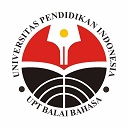Students’ Perceptions of Self-Directed Learning Experiences in Joukyuu Bunpou (Advanced Japanese Grammar) Learning
Abstract
Self-directed learning before face-to-face classes in the Joukyuu Bunpou course applied to help students develop analytical skills by independently identifying grammar patterns, understanding sentence context, simplifying new vocabulary, and practicing grammar in exercises. This study aims to understand students' perceptions of their self-directed learning experiences and the difficulties they faced in the Joukyuu Bunpou 2 course, referring to the theories of perception, self-directed learning, and learning difficulties. The research method used is qualitative with a case study design. Data collection techniques included questionnaires, interviews, and documentation, which were then analyzed using thematic analysis. Participants were selected through purposive sampling, consisting of ten students who had taken the Joukyuu Bunpou 2 course and achieved final grades of A, B, C, and D, to provide detailed insights into students' perceptions of self-directed learning experiences. The validity of the study was ensured through technique triangulation and member checks. The results of the study indicate that: (1) Students' perceptions of self-directed learning in the Joukyuu Bunpou 2 course are generally positive. Most students feel that self-directed learning is an effective strategy, provides satisfaction, helps improve their understanding of grammar, and boosts their confidence. However, students with lower performance levels (grades C and D) did not fully exhibit satisfaction and confidence. (2) The main difficulties students face include learning materials, learning sources, and psychological pressure. Based on response patterns, higher-performing students (grades A and B) tend to experience difficulties related to learning materials, learning sources, time management, and psychological pressure. On the other hand, lower-performing students (grades C and D) tend to face difficulties mainly related to learning materials and sources. Although self-directed learning has shown effectiveness in several aspects, the difficulties faced by students indicate the need for further investigation. Therefore, future research is recommended to expand its focus to other courses and to involve participants from various proficiency levels in a balanced manner, in order to gain a more comprehensive understanding of self-directed learning experiences in the context of foreign language education.
Keywords
Full Text:
PDFReferences
Armella, R. & Rifdah, K. M. N. (2022). Kesulitan belajar dan faktor-faktor yang mempengaruhi kesulitan belajar [Learning difficulties and factors that influence learning difficulties]. Sultan Idris Journal of Psychology and Education, 1(2), 23. https://doi.org/10.22373/je.v2i1.691
Cahyono, H. (2019). Faktor-faktor kesulitan belajar siswa MIN Janti [Factors of learning difficulties of MIN Janti students]. Jurnal Dimensi Pendidikan dan Pembelajaran, 7(1), 2. https://doi.org/10.24269/dpp.v7i1.1636
Ermawati, N., & Delima, Z. M. (2016). Pengaruh persepsi kemudahan penggunaan, persepsi kegunaan, dan pengalaman terhadap minat wajib pajak menggunakan sistem e-filing (studi kasus wajib pajak orang pribadi di Kabupaten Pati) [The influence of perceived ease of use, perceived usefulness, and experience on taxpayer interest in using the e-filing system (case study of individual taxpayers in Pati)]. Jurnal Akuntansi Indonesia, 5(2), 164. https://doi.org/10.30659/jai.5.2.163-174
Fatah, M., Suud, F. M., & Chaer, M. T. (2021). Jenis-jenis kesulitan belajar dan faktor penyebabnya sebuah kajian komperehensif pada siswa SMK Muhammadiyah Tegal [Types of learning difficulties and their causal factors: a comprehensive study on students of Muhammadiyah Tegal Vocational School]. Psycho Idea, 19(1), 90–91. https://doi.org/10.30595/psychoidea.v19i1.6026
Handayani, N. N. L., Dantes, N., & Suastra, I. W. (2013). Pengaruh model pembelajaran mandiri terhadap kemandirian belajar dan prestasi belajar IPA siswa kelas VIII SMP N 3 Singaraja [The influence of independent learning models on learning independence and science learning achievement of class VIII students at SMP N 3 Singaraja]. E-Journal Program Pascasarjana Universitas Pendidikan Ganesha, 3, 1–10.
Herawati, T. (2024). Penggunaan model pembelajaran genre based approach (GBA) dalam meningkatkan kemampuan membaca teks bahasa Inggris di SMKN 1 Rancaekek [The use of the genre based approach (GBA) learning model in improving English text reading skills at SMKN 1 Rancaekek]. 3.
Pinachesti, M. (2016). Hubungan antara belajar mandiri dengan hasil belajar matematika siswa kelas IV SD Negeri di Kecamatan Gunungpati Semarang [The relationship between independent learning and mathematics learning outcomes of grade IV students of public elementary schools in Gunungpati District, Semarang]. Universitas Negeri Semarang.
Riyaningrum, W. (2020). Persepsi mahasiswa tentang self-directed learning readiness (SDLR) terhadap metode pembelajaran S1 keperawatan FIKES UMP [Student perceptions of self-directed learning readiness (SDLR) towards the FIKES UMP undergraduate nursing learning method]. Jurnal Keperawatan dan Kesehatan, 11(2), 43–49. https://doi.org/10.54630/jk2.v11i2.128
Setyoningrum, A. & Sukestiyarno. (2019). Pengembangan pembelajaran mandiri melalui pendampingan modul berbasis HOTS untuk meningkatkan grit gan kemampuan koneksi matematis [Development of independent learning through HOTS-based module assistance to improve grit and mathematical connection skills]. Universitas Negeri Semarang, 98.
Simbolon, M. (2008). Persepsi dan kepribadian [Perception and personality]. Jurnal Ekonomi dan Bisnis, 2(1), 54.
Wu, J. (2014). Effects of learning styles on self-directed foreign language vocabulary learning. Studies in Self-Access Learning Journal, 112–126. https://doi.org/10.37237/050204
DOI: https://doi.org/10.17509/japanedu.v10i1.79320
Refbacks
- There are currently no refbacks.
Copyright (c) 2025 JAPANEDU: Jurnal Pendidikan dan Pengajaran Bahasa Jepang

This work is licensed under a Creative Commons Attribution-ShareAlike 4.0 International License.
 Published by:
Published by: Department of Japanese Language Education, Faculty of Language and Literature Education
Universitas Pendidikan Indonesia
 Online ISSN: Online ISSN:2528-5548 |

JAPANEDU: Jurnal Pendidikan dan Pengajaran Bahasa Jepang (e-ISSN:2528-5548) lisenced under a Creative Commons Attribution-ShareAlike 4.0 Internasional (CC BY-SA 4.0)


